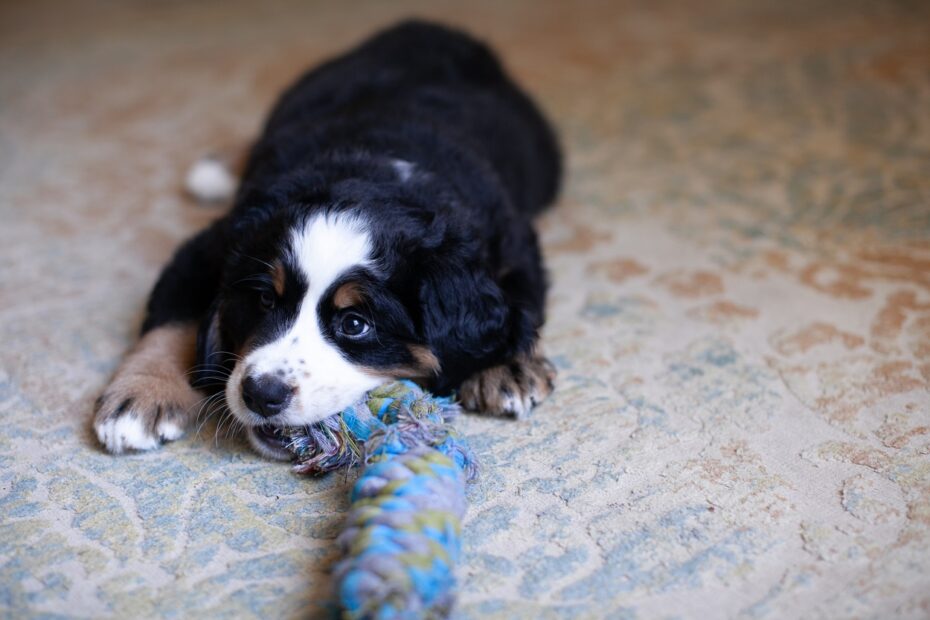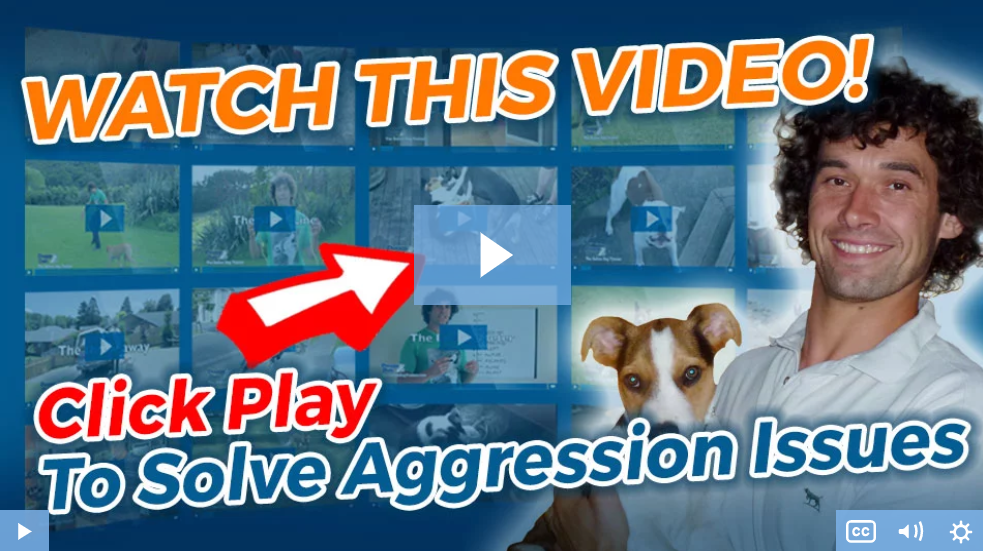If you want to learn how to stop an aggressive puppy biting …then this is the most important page you’re ever going to read.
Now, if your pup’s nibbles frequently turn into something more of a sinister, aggressive bite. It’s safe to say that you need to do everything in your power to address the issue ASAP.
Because if you don’t tackle the behavior while they’re young, chances are it will only get worse as they get older, bigger, and stronger. Potentially leading to more troubling behavior as time goes by.
But here’s the thing…
You also have to understand that biting or nipping is a completely natural part of your puppy’s development.
It’s ultimately how they explore different tastes, textures, and other exciting things (including your hand!).
So the idea here isn’t to necessarily stop biting completely. It’s more about teaching your puppy a little bit of bite inhibition while finding the right balance between what is and isn’t acceptable.
So what can you do?
Well, you’ll often find that some puppies begin biting earlier than others. And this is primarily based on their instincts and early experiences with other people and dogs.
In fact, a lot of owners actually find little nips a sign of affection, which is why most owners simply write it off as being totally innocent and a way for your puppy to show how much they love you.
The problem, however, is what follows as your puppy’s teeth begin maturing.
Because while those little nips might have previously seemed harmless, the sight of a little blood and the pain that soon follows will probably be enough to make you think twice…
…Regardless of whether or not there is any aggressive intent.
Now, preventing aggressive behavior like biting can become quite a challenge if you don’t have the know-how to address it correctly.
And this is why before you do anything else, I’d highly recommend taking a look at the short video below from Dan Abdelnoor (aka Doggy Dan) over at The Online Dog Trainer.
During the video, Dan talks specifically about why teaching your pup how to remain calm and in control of their emotions is the missing piece of the puzzle when it comes to dealing with unwanted aggression. Before going on to reveal a simple, highly powerful calming technique that reduces your pup’s natural impulse to bite.
Not only will you find this video helpful if your pup exhibits challenging behaviors like biting. It’s also a great resource for new dog owners who need a bit of help through the early days.
Anyway, here’s the video link to take a look: Click Here To Discover How To Finally Solve Your Puppy’s Aggressive, Unwanted Biting Problem, Using A Simple, Highly Powerful Calming Technique That Takes Just Minutes A Day To Implement… Even If You’ve Tried & Failed Before!
(video will open in a new window)
Why Does My Puppy Bite Me Aggressively?
So understanding why your puppy bites is the first step towards preventing the behavior.
As previously discussed, biting is a fairly common trait in younger dogs. And it’s something you probably don’t realize you’re encouraging during the early stages of their development.
That being said, you need to be fully aware of the potential reasons why your puppy may bite, so you can quickly stop things from getting out of control before things take a turn for the worst.
So let’s take a look at some of the most common reasons for biting.
It’s part of the teething process
All puppies explore the world through their mouths and go through an uncomfortable teething process that lasts for between 2-3 months.
During this time, you’ll find that your pup seems to chew anything and everything, from the sofa to your fingers!
This is a behavior your puppy WILL grow out of overtime and isn’t something you should necessarily be worried about just yet.
However, you also need to carefully watch out for aggressive puppy signs like a low growl, fixed stare, and bared teeth.
This is a clear sign of genuine aggression that, if left unchecked, will manifest into more troubling behavior as your puppy matures.
They’re being possessive
If it’s not just a natural part of their early development, you might just have a possessive puppy on your hands. Puppies can be possessive over all sorts of things…
…Their toys, their food, their sleeping area. Even their owner can sometimes be considered a possession if they deem it to be.
Worst still, biting is a sure-fire way of signaling their intentions towards anyone that tries to take them away.
They’re asserting their dominance
Although similar to possessiveness, dominant behavior is often your puppy’s way of trying to demonstrate that they’re the boss.
And because biting is one of the most prevalent ways to display dominance, you can be certain they’ll use it to their advantage if they think it’ll put you and/or other dogs in their place.
Now, the key with any type of dominant behavior is nipping it in the bud before it becomes a common occurrence.
Because if you don’t, you’ll simply be confirming to your puppy that their behavior is acceptable.
This is where The Online Dog Trainer Program I was talking about earlier really shows its value.
Because not only is it capable of teaching your dog to be calm and in control of their emotions. it’s also great at making your dog highly responsive to you.
Meaning they’re ultimately going to see you as the dominant pack leader.
They don’t know any better
If your puppy happened to miss out on socialization from an early age, chances are they won’t understand what is and isn’t acceptable when it comes to biting.
That being said, socializing your puppy should be one of the first things on your to-do list as it’s critical to developing their boundaries and educating them about what passes as appropriate.
Equally, if your puppy was born into a disruptive or aggressive environment (prior to living with you). They may automatically think that biting is necessary to get what they want and need.
This isn’t their fault, and it’s ultimately our job as owners to steer them in the right direction to get them up to speed with what they can and can’t do.
So, how do you recognize aggressive behavior in your puppy?
What clues can you look for that it’s more than just playful nipping and something more sinister?
Let’s take a look at some of the traits that indicate that your puppy is about to bite.
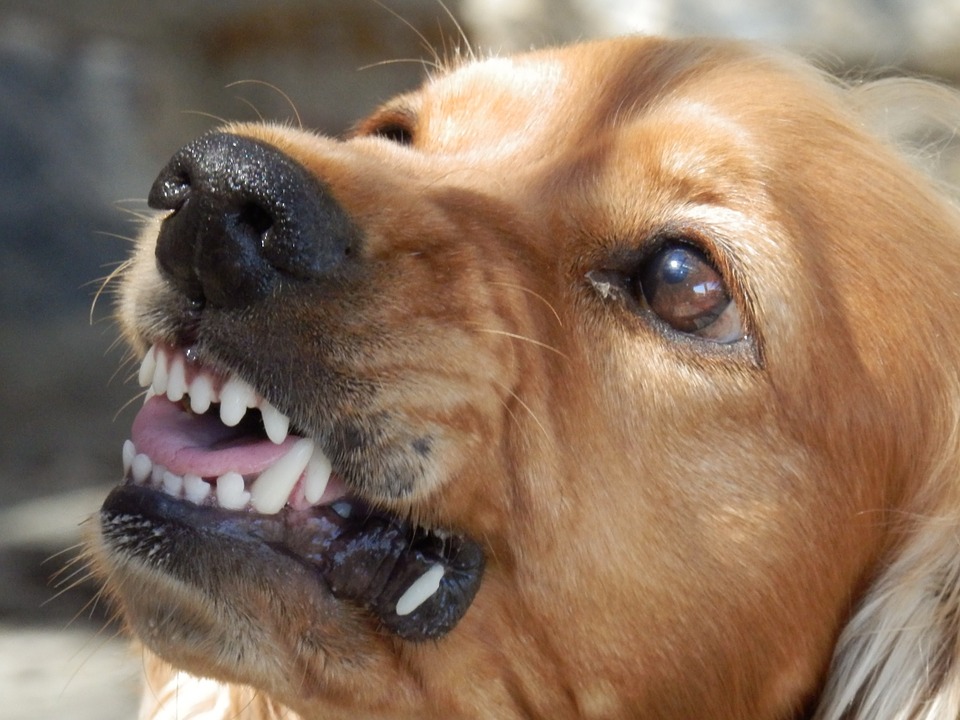
Aggressive Signs Puppies Display Before Biting
I know I briefly touched on this subject a little earlier. But I think it’s still important to reiterate what to look out for when your puppy is feeling aggressive or provoked.
And while every dog is different, below are some of the common signals your puppy might display before biting…
- A low growl – this is notably different from the more high-pitched growl your pup makes when playing. A low growl may also be accompanied by your puppy baring their teeth which is a clear indication they’re unhappy.
- A fixed stare – You can usually tell by your dog’s body language how they are going to respond to a particular situation. If they’re intensely zoned in or fixated on another person or dog. This is another clear warning signal.
- A stiff posture – Dogs straighten up before they lash out and bite. Again, this is another warning sign your dog is highly provoked.
If you spot any of the above warning signs, do yourself a favor and give your pup a little breathing room to calm down and relax.
This will differ depending on the severity of the aggression. But I’d recommend waiting no less than 10 minutes before attempting to reengage your pup. And only if the above warning signs are no longer present.
This would also be a great time to make use of the calming techniques over at the Online Dog Trainer to bring about the calm after the storm.
So if you haven’t done so already, watch the video and, more importantly, apply the training.
You’ll be glad you have it to hand when the time comes.
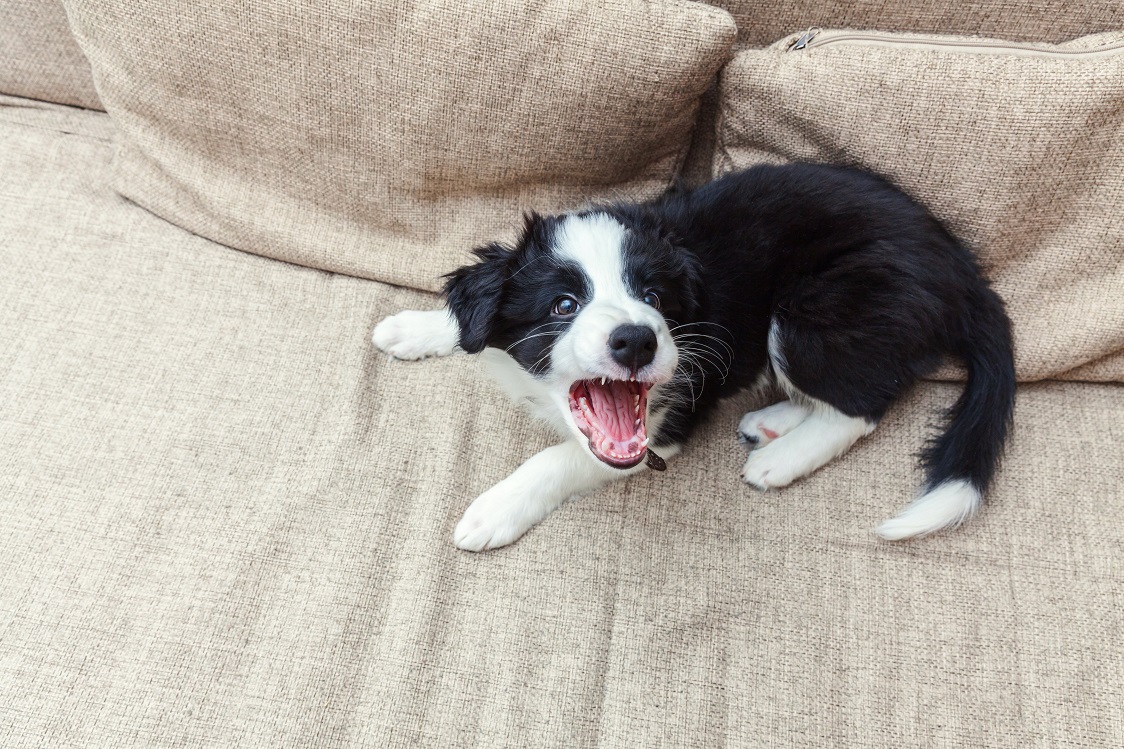
How To Stop An Aggressive Puppy Biting
So now that we’ve looked at the potential reasons behind your puppy’s aggressive biting habit. Let’s explore how to restore the peace so you can start seeing some notable changes in your pup’s behavior.
Exercise & Mental Stimulation
One of the many root causes of troubling puppy behavior can often be down to a lack of exercise or mental stimulation.
Just like crazy toddlers, puppies are bursting with life and pent-up energy. This is why it’s imperative to let them blow off a little steam as often as possible throughout the day.
You may not realize it, but regular, sufficient exercise (as well as mental stimulation) is often the key to helping them wind down when the occasion calls for it.
This will obviously depend on the breed of your pup, as some will need more exercise than others.
But you’d be doing yourself (and your pup) a huge favor by making a schedule and then sticking to it.
If you’re struggling for ideas, I’d recommend checking out Brain Training For Dogs as they’re got a really awesome program that’ll help turn your pup into a modern-day Einstein.
Better still, it’ll also help ween out any other particular training issues you may come up against in the future.
Discourage rough play
Although your puppy is likely to be boisterous, it’s important that you don’t encourage them to get too carried away during playtime.
I know this can be difficult, particularly if you have a naturally strong breed of dog that enjoys running rampant around the home.
But the more you encourage boisterous behavior, the more chance they have of lashing out, whether aggressively or not.
So do your best to slow the pace of play when your pup is overhyped.
Not only will it prompt them to calm them down. It’ll also make them less likely to inadvertently fall into aggressive behavior.
Make use of a no chew spray
There are countless products specifically designed to prevent your pup from chewing objects in your home.
They’re often referred to as ‘no chew sprays,’ and they work by putting an unpleasant taste in your puppy’s mouth every time they chew on the furniture.
The idea is that it will discourage them from biting or chewing things they normally would. Which is also great at helping them develop negative associations with chewing and biting-related activities.
Although it might seem like overkill, it can often be an effective solution to discourage unwanted biting.
Become the pack leader
As previously discussed, dominant displays of aggressive biting can often be how dogs assert themselves as the pack leader.
However, when that pack leadership mentality gets turned towards you. A fresh reminder is needed to reassert order.
An effective way to assert yourself as the leader is to simply demonstrate it to your pup on a consistent basis.
And you can do this by implementing seemingly small things like your adjusting your body language. Or, better still, eating before your puppy to give them a clear indication that you’re the one in charge.
Again, make sure to use the step-by-step calming exercises Dan demonstrates as this will naturally put your puppy into a calm submissive state.
It’ll also send them a clear message that whatever you say goes and that they would be wise to follow suit.
The idea here isn’t to intimidate your puppy in any way. It’s more about establishing trust and earning their respect so you can continue to build a bond over time.
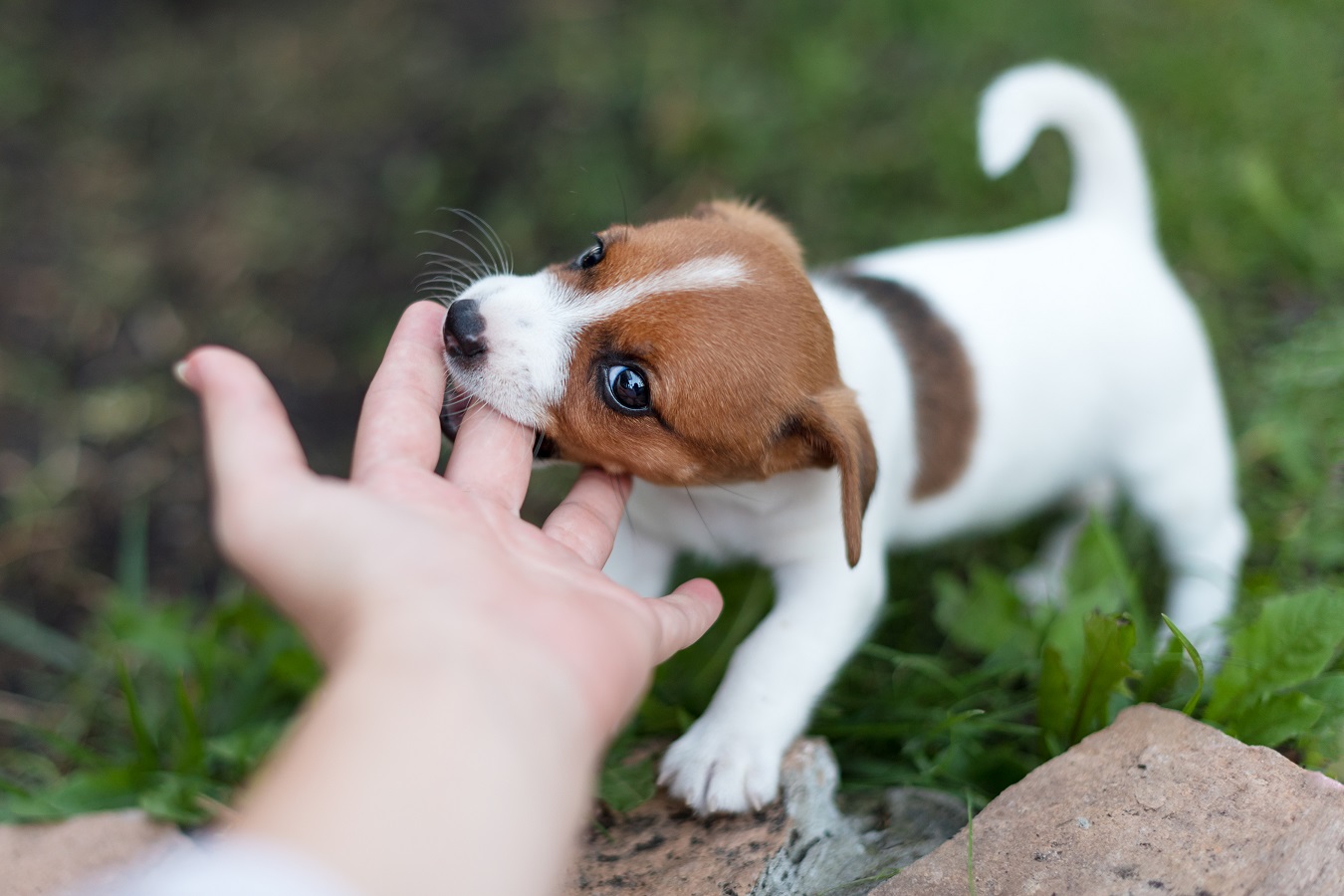
Wrapping Things Up
At the end of the day, biting is one of the more troubling behaviors exhibited by puppies.
Worse still, it often becomes more difficult to manage as your puppy matures.
The good news is that with the right training, it’s a behavior you can get rid of. Or at the very least, something you’ll be able to dial down to the point where it’s no longer an issue.
And while it won’t happen overnight, with a little time, patience, and understanding, they’ll get there in the end.
